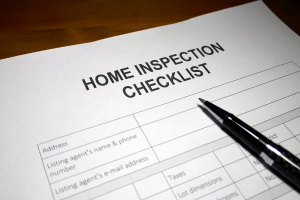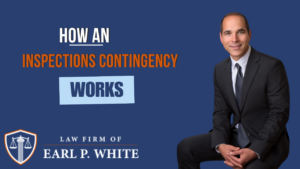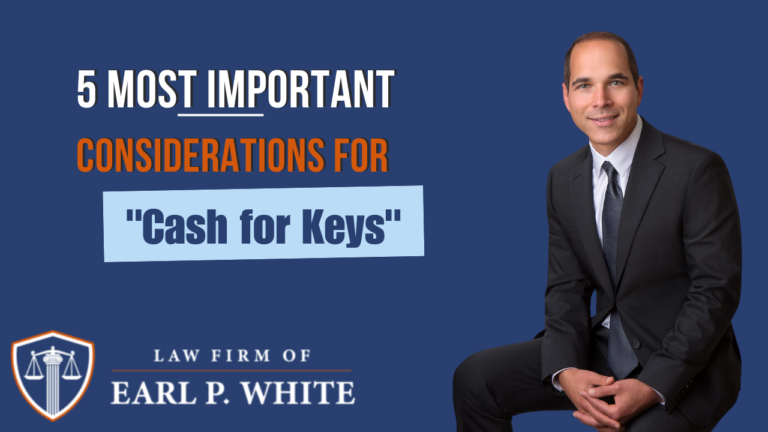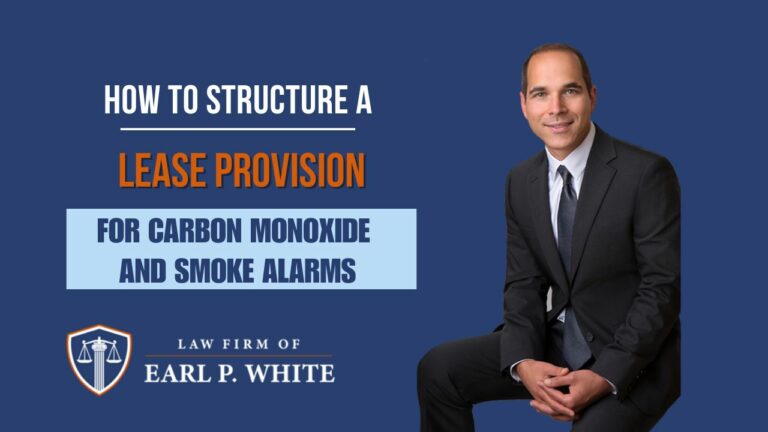Risk comes from not knowing. Conduct your due diligence, and make knowledge your greatest asset. Being a good investor relies on hard work and due diligence. Warren Buffet.
A real estate “inspection contingency” is the right of a buyer to inspect the property after the purchase and sale contract is executed. After conducting their due diligence, the buyer normally has the right to cancel the sale or re-negotiate purchase price, financial credits, or seller repairs.
The inspection contingency allows buyers to verify the property’s conditions before becoming obligated to close. Sellers should know how this contingency is drafted to compare different offers and anticipate the buyer’s intent and actions. Real estate brokers and attorneys must understand this clause to protect their client’s interests.
This blog explains features of inspection contingencies, standard procedure, buyer and seller preferences, and drafting clauses and alternatives.
Members of our free Real Estate Law Newsletter receive exclusive access resources for landlords, investors, and other real estate professionals. Join today!
Features of the Inspection Contingency
Timeframe for Inspections

The time frame for inspections is a primary parts of the inspection contingnecy. Residential buyers typically have 7 to 14 days to complete inspections. Commercial inspection periods are often 21 to 30 days as buildings are larger, have more units, and require more specialized inspections.
Buyers prefer a long period to ensure adequate time to complete and review inspection reports. Sellers prefer a period to avoid lost time and holding costs should the buyer cancel after inspecting.
Timeframe also varies based on:
Market Conditions / Negotiating Power: Buyers in a competitive market may be forced to shorten the time period to make the offer more favorable to the seller. Sellers may be forced to agree to a longer period if is only a handful of offers to choose from.
Type of Buyers: Property repair specialists, such as eneral contractors or house flippers, may need just a few days to walkthrough the premises. First-time home buyer, on the other hand, need a longer period of time to consult with other professionals.
Avaiability of Inspectors: Buyers may need additional time if specialist inspectors are required as they are not immediately available.
Types of Inspections

Buyers generally have a broad right to inspect most parts of the property.
The Realtor® standard residential contract in many jurisdictions permit the buyer to inspect “the dwelling and all other aspects”.
Paragraph 16(D) Buyer’s Right to Inspection. Buyer, at Buyer’s sole cost and expense, is granted the right to have the dwelling and all other aspects of the Property, inspected and evaluated by qualified inspectors . . . for purposes of determining the existence of any physical defects or environmental conditions. Standard Realtor® New Jersey Contract, August 2024.
Inspections conducted vary based on property type, neighborhood, and year built. Standard inspections include:
- General inspection: A licensed inspector assesses overall property condition.
- Underground oil tank search: To detect any environmental risks from old oil tanks.
- Radon test: Checking for radon levels in the property.
- Sewer scope: Examines the sewer line to the street.
- Wood Destroying Insects: Search for termites, carpenter ants, or other bugs that destroy wood.
- Septic / Water Well: Non-public sewer and water systems are usually tested.
Specialized inspections are virtually always recommended after initial inspections. For example, if a metallic object is detected underground an exploratory dig is recommended. A roofer is recommended if mold or water damage is found in an attic.
Buyer’s Rights After Inspection

Once inspections are completed, the buyer has several options based on the results. Sometimes the buyer has significant leverage through the unilateral right of cancellation which allows the buyer to cancel the sale or renegotiate without limitation.
This provision is advantageous for buyers, as it gives them full control over the transaction. If the inspection reveals major issues, they can request repairs, negotiate for a price reduction, or ask for a credit. If the seller refuses, the buyer can simply cancel the deal.
Seller’s Counterbalance: Right to Repair or Credit

While the buyer’s unilateral right to cancel can be powerful, sellers often negotiate terms to balance the process. Sellers may include provisions in the contract giving them the opportunity to either:
- Offer a repair: Sellers can fix the issues found in the inspection before closing.
- Provide a financial credit: Sellers can offer a monetary credit in lieu of repairs, which the buyer can use to address the problems after closing.
These clauses help protect the seller from losing the deal over minor issues, and ensure the buyer isn’t walking away for unjustified reasons. Importantly, buyers typically must provide professional inspection reports to justify any cancellation or renegotiation.
Negotiating Repair or Credit: Buyer’s Options

When inspections reveal issues, the buyer must decide whether to request repairs or a credit from the seller. Both options have advantages and disadvantages:
Requesting a credit
The buyer receives a financial allowance at closing and can choose their own contractors to handle the repair work. This approach offers flexibility, allowing buyers to delay repairs or use contractors they trust. However, the buyer assumes the risk if the cost of the repair exceeds the credit amount.
Requesting seller repairs
The seller handles the repair work before closing. While this option shifts the risk of cost overruns to the seller, buyers should be cautious. Sellers may opt for lower-quality contractors or rush the work since they won’t own the property after closing. Buyers should ensure that any repairs are done by licensed and insured contractors.
Protecting the Buyer: Important Contract Provisions

If the seller agrees to complete repairs, the buyer should insist on certain safeguards to ensure the work is done properly. These include:
Conclusion
The inspection contingency allows buyers to make informed decisions about a property based on its condition. For real estate professionals, understanding how to navigate this process—whether it involves negotiating repairs, credits, or contract provisions—ensures a smooth and balanced transaction.
Stay ahead with our free newsletter: The Real Estate Law Newsletter – your source for real estate law news.
Essential updates and insights direct to you. Impress clients and colleagues with trending news. Sharpen expertise. Stay legally compliant. Access free legal forms. Don’t miss out – join today!









